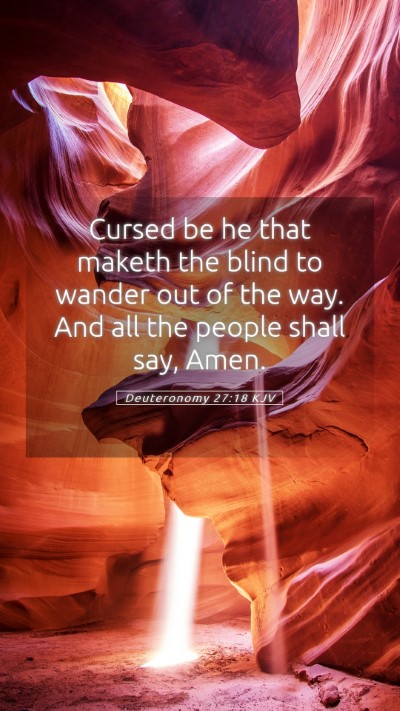Understanding Deuteronomy 27:18
Verse Context: Deuteronomy 27:18 states, "Cursed be he that maketh the blind to wander out of the way. And all the people shall say, Amen." This verse is part of a series of curses pronounced upon those who violate God's commandments, reflecting the moral and ethical landscape that the Israelites were to uphold.
Bible Verse Explanation
In examining the meaning of Deuteronomy 27:18, we find significant insights from various public domain commentaries, shedding light on the societal and spiritual implications of leading the vulnerable astray.
Matthew Henry's Commentary
Insight: Matthew Henry highlights the moral obligation towards the blind and vulnerable members of society. He notes that leading a blind person away from the right path is not only a physical hazard but also a spiritual and ethical failing. This reflects a broader commandment of caring for those less fortunate.
Albert Barnes' Commentary
Interpretation: Albert Barnes emphasizes the weight of this curse as indicative of God’s concern for justice and equity among His people. He underscores that causing the blind to stray not only harms the individual but also disturbs the community's moral fabric. This call for accountability serves to protect society's most vulnerable.
Adam Clarke's Commentary
Analysis: Adam Clarke provides further depth by situating this verse in the context of the covenant community. He points out that the curse serves as a warning against exploitation. It reaffirms the collective responsibility of the Israelites to uphold the principles of fairness and compassion, aligning with the overarching theme of love thy neighbor.
Key Themes
- Compassion and Care: The verse highlights the necessity of compassion, particularly towards those who cannot see or discern danger, urging us to guide the blind rather than lead them astray.
- Social Justice: This curse reflects a broader command for social justice, where the vulnerable are protected and treated with respect.
- Moral Accountability: The repetition of "Amen" by the people shows their agreement and acknowledgment of the shared responsibility for maintaining these ethical standards.
Cross References
- Leviticus 19:14: This verse echoes the command to not put a stumbling block before the blind, reinforcing the call to social responsibility.
- Matthew 18:6: Jesus warns against causing little ones to stumble, aligning with the emphasis on accountability towards the vulnerable.
- Luke 14:13-14: Jesus encourages invitation to the poor and blind, promoting an ethic of inclusion and care.
Applying the Verse to Daily Life
The application of Deuteronomy 27:18 in everyday life calls for reflection on how we treat those who may be marginalized or unable to navigate the complexities of life. It invites us to engage in Bible study groups, where we can discuss how to interpret Bible verses, understanding difficult Bible passages in the context of our communities.
Conclusion
Through the insights gathered from these commentaries, we glean a rich understanding of the ethical implications of Deuteronomy 27:18. This verse serves as a reminder to cherish and protect those who may be blind or vulnerable in various forms. Engaging in online Bible study can further enhance our comprehension and application of such profound Scripture.


